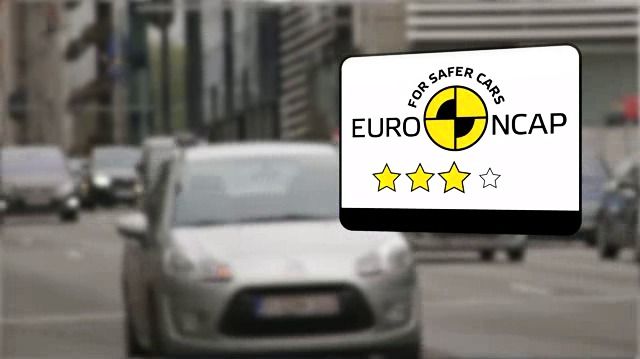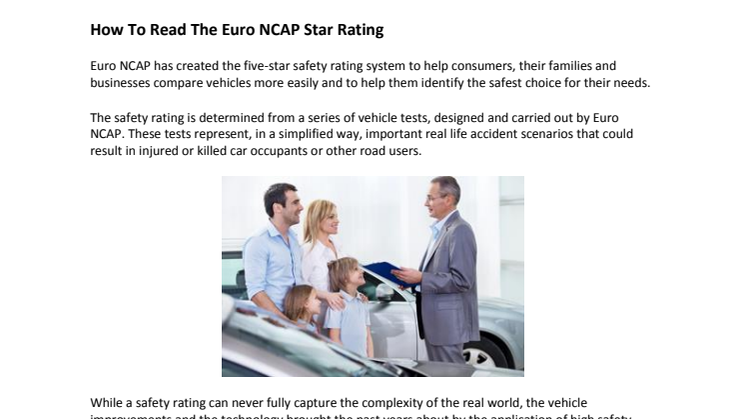Press release -
Car Buyers urged to read the detail to ensure they pick the safest car
Thatcham Research, the independent automotive research centre, and voice of Euro NCAP in the UK, continues to urge vehicle manufacturers to fit life-saving safety technology such as Autonomous Emergency Braking (AEB) to cars as standard, rather than as an optional extra. This drive to improve safety is once again reinforced by the latest Euro NCAP testing results, announced today, which show that consumers need to choose and spec their cars carefully.
While 2016 has seen some very good Euro NCAP results, those announced today show disappointing outcomes for two superminis. The Suzuki Ignis and SsangYong Tivoli both only received a Three Star Euro NCAP rating. The addition of optional safety packs increased the score on the Suzuki Ignis to a Five Star Rating, and for the SsangYong Tivoli to a Four Star Rating.
Thatcham Research has found the take up of optional safety packs to be extremely low, less than 3% in the UK. The effect of this is that the majority of Suzuki Ignis and SsangYong Tivoli cars on the roads will be Three Star Euro NCAP rated cars, and will not include safety features like AEB that have been proven to reduce rear to end crashes by up to 38%.
“We’re increasingly seeing car makers opt for a Euro NCAP Dual Rating – a score for the standard car, and then a second rating with the optional safety pack. Car buyers need to make sure that they understand this rating and speak with their dealership to spec their cars carefully”, commented Matthew Avery, Thatcham Research’s Director of Research. “Don’t be misled – do your research, as it’s only by choosing the optional safety packs that you will be getting the levels of safety you should expect.”
The optional pack to look for on the Suzuki Ignis is the “Dual Camera Brake Support”, while for the SsangYong Tivoli it is “AutoBrake with Forward Collision Warning”.
Ford Edge and Hyundai Ioniq - 5 Star Ratings but Rear Occupant Safety below Par
While the Ford Edge and Hyundai Ioniq's received overall 5 Star Euro NCAP ratings, and scored well in active safety features that prevent a crash in the first place, car buyers need to be aware that both scored below standard in rear passenger protection. While both models protected children buckled in to child car seats, some of the injury parameters for both neck and chest exceeded safe limits for adult passengers.And when tested for six year old and ten year old children sitting on booster seats, the safe limits were also exceeded. This is a real issue for cars targeted at families with children, or carrying elderly passengers.
With the Ford Edge for example, in the frontal offset test, the readings in both the adult test, as well as with the “6 year old” dummy placed in booster seat, only provided marginal protection of the chest and poor protection of the neck. Similarly, protection of the neck was rated as poor for the “10 year old” dummy in a booster seat, as a result of high tensile forces during the test.
A similar scenario was detected with the Hyundai Ioniq, with neck protection a concern with both the "6 year old" and "10 year old" dummies seated in booster seats, and marginal chest protection with the "10 year old" dummy in a booster sear.Children and the elderly are specifically susceptible to neck injuries due to the high loads and stresses placed on them during crashes.
“The Ford Edge and Hyundai Ioniq are likely to be targeted at families with children or carrying elderly passengers,” continues Matthew Avery, Thatcham Research’s Director of Research, “so to have rear passenger scores where both head and chest injury parameters exceed safe limits is of particular concern to us. Both manufacturers seem to have it wrong with the level of rear seatbelt tension they provide.
“Our advice to consumers is don’t just take Euro NCAP ratings at face value, look at the detail. If the safety of your rear passengers is important to you, and it should be, then there are other vehicles in the same category that have been tested in 2016 and rated 5 Stars that have far better rear occupant protection.”
Audi Q2 – 5 Star Rating with high levels of occupant protection
In contrast, the Euro NCAP Five Star Rated Audi Q2 scored a 93% adult occupant rating and 86% child occupant rating, offering similar high levels of protection to occupants of different sizes, no matter where they sat in the car.
Thatcham Research Chief Executive, Peter Shaw, said: “We are disappointed to see that both the Suzuki Ignis and the SsangYong Tivoli continue to only offer AEB as an option. Car buyers expect safety equipment that is proven to prevent crashes to be standard. Both manufacturers can do more.
“What is more alarming with this set of Euro NCAP results though, are the rear occupant protection scores of the Ford Edge and Hyundai Ioniq. To have neck and chest results, especially for children, which exceed safety limits and risk serious injury is just not acceptable. Ideally we’d be looking for Ford and Hyundai to fix the issues and resubmit for retesting.“
Euro NCAP created the five-star system to help consumers, their families and businesses compare vehicles more easily and to help them identify the safest choice for their needs. The safety rating is determined by a series of vehicle tests, designed and carried out by Euro NCAP. These tests represent, in a simplified way, important real-life accident scenarios which could result in injury or death to car occupants or other road users.
While a safety rating can never fully capture the complexity of the real world, the vehicle improvements and safety technology introduced over the past few years have been shown to deliver a very real benefit to consumers across Europe.
Thatcham Research continues in its mission to encourage manufacturers to fit safety systems as standard, potentially saving hundreds of lives on UK roads every year, as well as providing consumers with the information needed to buy the safest car they can afford.
Topics
- Transport
Categories
- vehicle safety
Thatcham Research is the independent voice of automotive safety & repair, advising motorists, insurers and vehicle manufacturers to help reduce accident frequency, severity and costs and to realise the vision of ‘Safer cars, fewer crashes’.
As well as its world leading crash and track research, Thatcham Research tests and accredits crash repair parts, vehicle repair technicians, and a number of other products and services within the collision repair industry for insurers, motor manufacturers, equipment manufacturers and suppliers.
A founder member of the international Research Council for Automobile Repairs (RCAR), Thatcham Research has also been a member of the European New Car Assessment Programme (Euro NCAP) since 2004.


